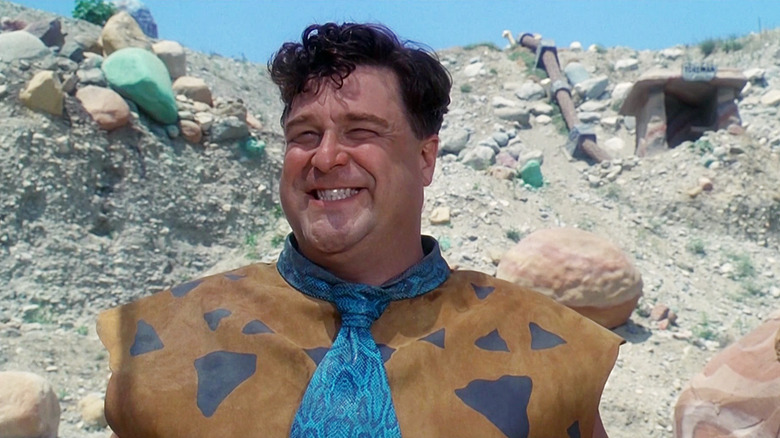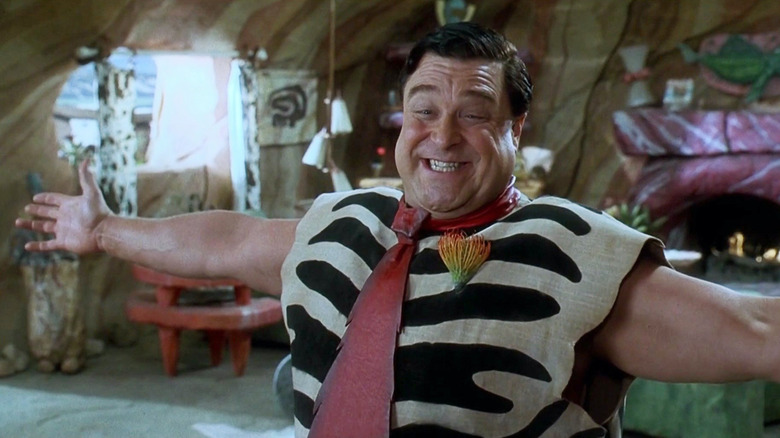John Goodman Begged Steven Spielberg To Spare Him From Flintstones Movie Sequels
30 years after its release, director Brian Levant's "The Flintstones" remains an incredible-looking movie. The 1994 live-action take on Hanna-Barbera's famous prehistoric cartoon sitcom is littered with astonishingly detailed practical sets bringing the primitive suburbia known as Bedrock to colorful life. Equally remarkable are the practical animatronics used to realize the various critters that function as household items in the "Flintstones" universe, including a "garbage disposal" in the form of a Stone Age pig-like creature known as the Pigosaurus and the sassy "recording device" known as the Dictabird. Tragically, though, the movie's original puppet for the Flintstones' pet dinosaur, a Snorkasaurus named Dino, was replaced with a (nowadays, very dated) CGI version during development, as detailed in Patrick (H) Willems' excellent video essay, "The Rise And Fall Of Muppet Cinema."
The problem with "The Flintstones," is, well, everything else. Being rooted in mid-20th-century suburban stereotypes, the characters from the "Flintstones" cartoon aren't substantial enough to sustain a feature-length film. Similarly, the actual plot — which sees Fred Flintstone (John Goodman) go from being a lovable oaf to a self-absorbed executive, unaware that he's secretly a pawn in his boss' (Kyle MacLachlan) illicit schemes — bears an uncanny resemblance to, by an amusing coincidence, another 1994 comedy about corporate malfeasance (the Coen Brothers' "The Hudsucker Proxy"), but without the clever pastiche work and inspired absurdity. Even an all-star cast that also includes Rick Moranis, Elizabeth Perkins, Rosie O'Donnell, and Halle Berry isn't enough to make what's happening onscreen anywhere near as entertaining or interesting as the movie's production design.
Despite the movie's unflattering critical response, "The Flintstones" was a huge box office hit, making over $358 million against a $45 million budget. This, of course, meant Universal Pictures was eager to make sequels to the Steven Spielberg-produced film ... much to its star's distress.
Goodman said 'Yabba Dabba No!' to a Flintstones trilogy
Goodman has never been afraid to play in the tentpole sandbox, but he doesn't prefer to live there. Incidentally, he started collaborating with the Coens as early as their second film, 1987's "Raising Arizona," and would reunite with them four years after "The Flintstones" for their 1998 cult classic "The Big Lebowski" (a movie that really does sum up everything you need to know about the brothers). However, that might've never happened, had Goodman been roped into shooting a pair of "Flintstones" sequels back-to-back as Universal and Spielberg's production company Amblin wanted.
As Levant explained in an interview published by Total Film magazine to mark the film's 30th anniversary, "They wanted to do the same thing with 'The Flintstones' that they did with 'Back to the Future' and shoot [two sequels] back-to-back." (Spielberg, Amblin, and Universal, in case you had forgotten, had previously backed director Robert Zemeckis' classic time-travel adventure.) Goodman, on the other hand, was more than ready to leave his days yelling "Yabba dabba do!" behind. "He made an appointment with Spielberg and said, 'Please don't make me do any more of these,'" Levant recalled.
One suspects Goodman wasn't alone in feeling that way, considering none of the original "Flintstones" movie cast returned when the live-action franchise finally continued with the 2000 prequel "The Flintstones in Viva Rock Vegas." That film, which was also helmed by Levant, fared a bit better critically, but by that point, audiences had moved on (with the movie grossing only $59 million on a $58 million budget). Much as I sympathize with Levant for being dealt what was clearly a losing hand with "Viva Rock Vegas," I'd also be lying my keister off if I said I wished that Goodman made those sequels instead of "The Big Lebowski."

